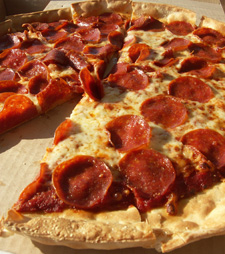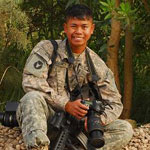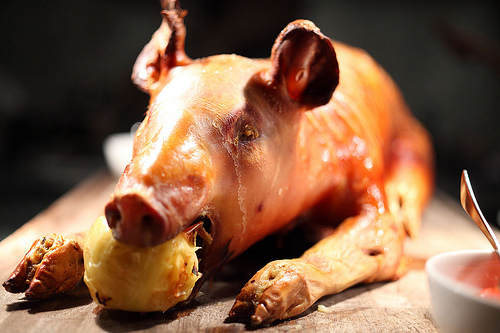By J.p. Lawrence
Unexpected Discoveries on a Trip Home to the Philippines
One of the great joys of being an American boy at age fifteen is that you get to eat whatever you want without feeling guilty about anything.
Far off are the days of fearing carbs, of hand-wringing over free-trade organics, of vegetarianism and veganism and gluten-free living. No, the fifteen-year-old American boy is an unrepentant omnivore in his natural environment, a voracious grazer of anything fried, grilled, baked, or right out of the bag.
 And when I was fifteen, I reveled in the tasting. I loved the taste of salt. I loved the taste of sugar. I loved scraping clear my plate, knowing seconds and thirds were mine for the taking. I loved swaggering into a buffet, knowing I'd get my parents’ money’s worth and more.
And when I was fifteen, I reveled in the tasting. I loved the taste of salt. I loved the taste of sugar. I loved scraping clear my plate, knowing seconds and thirds were mine for the taking. I loved swaggering into a buffet, knowing I'd get my parents’ money’s worth and more.
And money was always a concern. My mother was a fresh-off-the-boat immigrant, and, growing up, I was always aware of how other children had better toys and birthday parties. So I was surprised when, after years of scrimping, my parents had enough money to visit relatives in the Philippines.
The last time I'd been in the land of my birth, I was age two-and-a-half and leaving for America. During the course of my little childhood in rural Minnesota, I had consumed and been consumed by American culture. The whole month we were back in the Philippines, I chafed at the strangeness of the place. All I wanted was to be home in America playing video games with my friends, away from the dirty streets and squat toilets and strange relatives who remembered me when I was a small child and were disappointed when I couldn’t remember them back.
Eventually, our family wound up in Bacolod, a southern city of half a million, known as the “City of Smiles” and famous for its lechón, or roasted suckling pig.
Lechón is a delicacy passed down from the days of the Spanish conquest. Served at special events, it features a young pig, skewered, gutted, and cooked whole over charcoal. Lechón takes an entire day to prepare and roast, but the reward is crispy, crackly, golden skin and tender white meat that’s so moist the only way to eat it is to let it linger on your tongue until it melts like chocolate in the recesses of your deepest, fondest memories.
To eat lechón is to be transported to a world where nothing matters but the zest of life and how to prolong it.
My relatives made lechón for a living. Their storefront was brightly painted in blues and reds and stood next to a brightly colored Internet cafe. Both enterprises were perched beside a bustling six-lane highway lined with buildings, also brightly painted.
Everyone sat outside on stools as they awaited the closing of the day. American pop music from six years before came through a radio in the center of the store, and on the second story, where my relatives lived, American cartoons flashed and blared on a TV set.
The pig itself sat as the guest of honor in the center of the dining area. The pig’s head, its mouth closed on an apple, was as untouched as a wallflower at homecoming, while guests walked up and ripped its body apart.
We had our fill that day of lechón and Coca-Cola. As the party wound down, I decided to take a walk through the alleyways behind the store. My gut felt tight with what seemed like half the hog, but as I walked off my gluttony, I began to feel better.
As I turned the corner, I noticed that all the color had disappeared. Hidden behind the painted storefronts was a separate world for the poor, a place where everything was gray, leaden, dusty. The road twisted at right angles as it led me deeper into this world. The two- and three-story houses that lined the side of the road towered over the tiny barefoot children who ran past, wearing threadbare shirts so thin the sun shown through.
The brackish brown-green water of an open canal served as my guide. As I walked over the many bridges, I saw a ninety-pound skeleton of a man chopping lumber and three women washing clothes where the canal took a bend and finally disappeared into a sewer.
The smell was horrible. Farms in miniature hid in alcoves underneath houses. Chicken shit was everywhere, on the fences, on the road, on the chopping blocks used to cut off their heads. At one point, I stopped at a pigpen filled with pigs, tiny runty creatures, not at all like the glazed golden specimen I had indulged in not long before. There were three of them, and I felt sick, and I felt lost.
I’d like to say that seeing that secret world changed me in some way, that I gained a perspective about my luck in life, and that my life was made better because of it.
But, although I felt bad, I knew that there was leftover lechón for the taking. I was full, I was gluttonous, but I found my way back to the party and ate more lechón anyway.
Lechón was too tempting. Lechón felt too good. I felt no guilt until later.
Art Information
- “Pizza” © Stephen J. Sullivan; stock image
- “Roasted Sucking Pig” © Ccho; Creative Commons license
 J.p. Lawrence is a veteran of Operation Iraqi Freedom. He served in southern Iraq from 2009 to 2010 as a military journalist with the 34th Red Bull Infantry Division. His deployment consisted of traveling to a strange new place, meeting strange new people, and gaining an understanding. He wrote more than 100 pieces there. Currently, he continues his Army career in between studying creative writing and anthropology at Bard College.
J.p. Lawrence is a veteran of Operation Iraqi Freedom. He served in southern Iraq from 2009 to 2010 as a military journalist with the 34th Red Bull Infantry Division. His deployment consisted of traveling to a strange new place, meeting strange new people, and gaining an understanding. He wrote more than 100 pieces there. Currently, he continues his Army career in between studying creative writing and anthropology at Bard College.
“Since I lost my childhood wonder of flying, I’ve thought that an airplane is like getting stuck in an elevator with 300 other people, where everyone is just waiting to be somewhere else. In the end we are just statistical noise, a few DNA patterns away from the chicken in an in-flight meal.” — Jetlag: A Love Story

